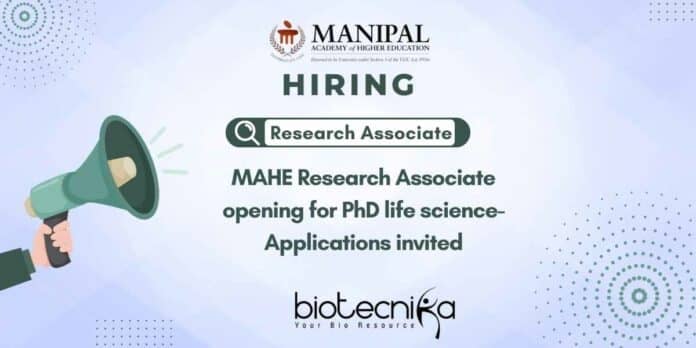MAHE Research Associate Opening For PhD Life Science – Applications Invited
MAHE Research Associate Opening For PhD Life Science – Applications Invited. PhD Jobs. Life Sciences candidates can apply for the research associate job opening at MAHE Manipal. Interested and eligible applicants can check out all of the details on the same below
This job expires in
Manipal Academy of Higher Education (MAHE), Manipal invites applications from
eligible candidates for the Research Associate – I position of Indian Council of Medical
Research (ICMR) funded project titled ’Investigating the role of USP1 deubiquitinase in
generating matured insulin producing β-cells using iPSC based model system’. MAHE PhD LifeScience Research Job details are provided below. Apply now if you are interested.
Job role -Research Associate – I
No. of Post: 01
Name of the Project: ’Investigating the role of USP1 deubiquitinase in generating matured insulin producing β-cells using iPSC based model system’.
Duration: Six months (September 01, 2023 to March 31, 2024).
How to apply –
Candidates possessing the requisite qualification may send a detailed CV with copies of relevant certificates in support of the qualification and experience to the following email id / address by August 19, 2023.
No TA/DA will be paid for attending the interview.Director – HR
Manipal Academy of Higher Education
Madhav Nagar, Manipal, 576104
Udupi, Karnataka, India
e-mail: [email protected]
Phone: 0820 – 2922062; 2923433
Qualification –
- PhD in any life science stream (Thesis submitted candidates are also eligible)
- Knowledge of Immunoprecipitation, ChIP, gene editing techniques and experience in cell culture is preferred
Consolidated Pay: Rs. 47,000 + HRA @ 24% on consolidated pay, per month
Check the notification below
Please go through the below-given interview questions and answers for PhD LifeScience Research Job. Prepare well. Good luck!!!
Question 1: Can you describe your experience with Immunoprecipitation, ChIP, gene editing techniques, and cell culture in the context of life science research? Answer: Certainly. During my PhD research, I focused on studying the molecular mechanisms underlying cell differentiation. I have hands-on experience with techniques such as Immunoprecipitation and ChIP to investigate protein interactions and epigenetic modifications. I also worked with gene editing techniques like CRISPR-Cas9 to manipulate specific genes and observe their effects on cell behavior. Additionally, I have extensive experience in cell culture, having maintained various cell lines to simulate in vivo conditions. My practical knowledge in these techniques equips me to effectively contribute to the research objectives of the project.
Question 2: How does your research background align with the objectives of the ICMR-funded project focused on insulin-producing β-cells? Answer: My research background is closely aligned with the project’s objectives. My PhD work primarily revolved around understanding cellular differentiation processes, which is crucial for generating matured insulin-producing β-cells. My experience in investigating cellular signaling pathways, epigenetic regulation, and gene expression dynamics makes me well-suited to contribute to this project. I am excited about the opportunity to apply my expertise to unravel the role of USP1 deubiquitinase in this specific context using iPSC-based models.
Question 3: Could you share an example of your ability to work effectively in a time-bound research project? Answer: Absolutely. During my PhD, I was part of a time-sensitive project aimed at understanding the impact of a certain protein on stem cell differentiation. Given the project’s scope and timeline, I had to design experiments, carry out the necessary assays, and analyze results within a fixed timeframe. I successfully managed my time, collaborated with team members, and met project milestones. This experience has honed my skills in conducting focused research within tight schedules, which I believe will be valuable for the six-month duration of this position.
Question 4: How have you demonstrated your ability to work independently while contributing to a larger research team? Answer: In my PhD, I worked as part of a larger research group focused on developmental biology. While collaborating with my peers, I independently managed specific aspects of our research. For instance, I designed and executed experiments related to cell differentiation pathways and presented my findings in group discussions. This demonstrated my capacity to work within a team while taking ownership of specific research components. I believe this blend of teamwork and autonomy will be advantageous in contributing effectively to the project’s objectives.
Question 5: The project requires experience in cell culture techniques. Could you elaborate on your proficiency in this area? Answer: Absolutely. During my research journey, I have gained substantial expertise in cell culture techniques. I have routinely cultured various cell lines, ensuring their proper maintenance and growth under controlled conditions. I’ve also been involved in optimizing culture protocols to mimic physiological environments and enhance experimental reliability. This hands-on experience has equipped me to handle cell culture-related aspects of the project, contributing to the successful generation and analysis of insulin-producing β-cells using iPSC-based models.
Editor’s Note: MAHE Research Associate Opening For PhD Life Science – Applications Invited. Please ensure you are subscribed to the Biotecnika Times Newsletter and our YouTube channel to be notified of the latest industry news. Follow us on social media like Twitter, Telegram, Facebook






























